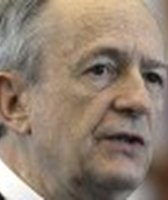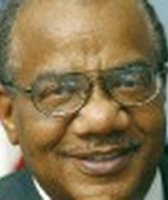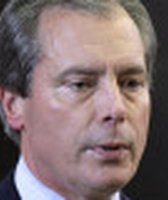Stand up for the facts!
Our only agenda is to publish the truth so you can be an informed participant in democracy.
We need your help.
I would like to contribute
Lt. Gov. David Dewhurst’s campaign posted a video online Nov. 7, 2011, assailing President Barack Obama’s record with a couple of edited TV clips that distort journalists’ statements.
The video opens with on-screen text that says, "He promised us hope and change," and then cuts to interspersed shots of Obama and journalists speaking about economic troubles, all set to an urgent symphonic theme.
The offering from Dewhurst, who is seeking the U.S. Senate seat being vacated by Kay Bailey Hutchison, is similar in style to one from Gov. Rick Perry’s presidential campaign that we dug into last month. Our analysis of that video revealed that because of artful editing, comments on health care reform from Obama and Mitt Romney, Perry’s Republican rival in the presidential contest, were taken out of context, leaving viewers with the wrong impression about what the men were talking about and the points they were making.
A similar inspection of Dewhurst’s video, which attacks Obama’s economic record and touts Dewhurst’s ideas for one minute and 13 seconds, identified a similar manipulation of television excerpts. Unlike the Perry video, however, Dewhurst’s video primarily contorts the words of journalists, not politicians.
The first instance occurs about 20 seconds into the Dewhurst video, when viewers see a reporter standing up at a White House news conference say to Obama: "But under your budget, the debt will increase $7 trillion over the next 10 years, the most irresponsible budget in American history, passing on our problems to the next generation."
We wondered whether the reporter, who we identified as Chip Reid of CBS News, actually called Obama’s proposed budget "irresponsible." Not so, according to video and a transcript of the March 24, 2009, press conference.
Viewers are left with that impression, however, because chunks of Reid’s query to Obama are not in the Dewhurst video. Another distortion: The last phrase attributed to Reid in Dewhurst’s video — "passing on our problems to the next generation" — was part of his question to Obama, not a declarative statement.
Here’s what Reid said to Obama: "At both of your town hall meetings in California last week you said, quote, ‘I didn't run for president to pass on our problems to the next generation.’ But under your budget, the debt will increase $7 trillion over the next 10 years; the Congressional Budget Office says $9.3 trillion. And today on Capitol Hill some Republicans called your budget, with all the spending on health care, education and environment, the most irresponsible budget in American history. Isn't that kind of debt exactly what you were talking about when you said ‘passing on our problems to the next generation’?"
Bottom line: Reid did question the potential impact of Obama’s budget proposal on the national debt, but he didn’t call it irresponsible. At that point in his remarks, he was repeating charges made by Republicans in Congress.
The next clip in the Dewhurst video also wrongly attributes someone else’s opinion to a TV journalist. We identified her as Kiran Chetry, who was an anchor for CNN’s American Morning show through July 2011.
Dewhurst’s video shows a close-up of Chetry’s face as she’s heard saying: "The massive spending plan is not the answer to the economic crisis. The economy is in a really, really tough spot, arguably one of the worst that we have seen in modern times."
Chetry spoke those words on the program’s Jan. 29, 2009, edition — but hardly in that order. They were uttered about 25 seconds apart in a segment about the roughly $800 billion stimulus package that Obama signed into law the following month. But they are spliced together for the Dewhurst video. Further creative cutting of Chetry’s first phrase — that the stimulus package "is not the answer to the economic crisis" — makes it appear she was offering those words as her own analysis when that was not so.
Rather, according to video of the segment and CNN’s transcript, Chetry spoke those words while explaining the views of some libertarians. Introducing Cato Institute economist Alan Reynolds during the show, Chetry said: "It's not just the politicians that are debating the stimulus package. There's a small but vocal group of economists and libertarians who believe that the massive spending plan is not the answer to the economic crisis."
Another TV clip in Dewhurst’s video is of Obama saying "the public is not paying close attention." It precedes the doctored videos of Reid and Chetry.
We weren’t entirely clear what impression the Dewhurst campaign was trying to make with the Obama clip. Was it suggesting that Obama thought the public wasn’t looking as he tried to push through economic policies that Dewhurst and others see as bad for the economy and the country?
The clip in the Dewhurst video is from a White House news conference on July 11, 2011, amid the tumultuous debate in Washington over raising the U.S. debt ceiling, the legal limit of how much money the government can borrow. At that time, Democrats and Republicans were sparring over what deficit-reduction measures — such as spending cuts and tax increases — should be part of a plan that would also increase the debt ceiling.
According to video of that press conference, Obama uttered the "public" phrase while responding to a question from Reid about why congressional leaders and the White House had yet to agree on a deal. Citing a CBS News poll, Reid told Obama that a majority of Americans opposed raising the debt limit. "So isn’t the problem that you and others have failed to convince the American people that we have a crisis here, and how are you going to change that?" Reid asked.
Obama’s lengthy response begins: "Well, let me distinguish between professional politicians and the public at large. You know, the public is not paying close attention to the ins and outs of how a Treasury auction goes. They shouldn’t. They're worrying about their family; they're worrying about their jobs; they're worrying about their neighborhood. They've got a lot of other things on their plate. We're paid to worry about it."
The U.S. Treasury finances the public debt by selling securities such as Treasury bills and bonds through regularly scheduled public auctions.
Obama continued: "I think, depending on how you phrase the question, if you said to the American people, is it a good idea for the United States not to pay its bills and potentially create another recession that could throw millions of more people out of work, I feel pretty confident I can get a majority on my side on that one."
Upshot: The Dewhurst video seems to mislead by showing only a portion of Obama’s comment and implying that he said the public wasn’t paying close attention to his economic proposals generally when, in fact, he said Americans don’t pay attention to Treasury auctions.
David Beckwith, a consultant to Dewhurst’s campaign, had no comment on the ad’s editing of the journalists’ statements; he stood by the video’s use of the Obama clip. Generally, Dewhurst’s campaign later told us that its web video accurately reflects Obama’s "abysmal" spending record and "his flawed policies that have badly damaged the economy."
Our Sources
PolitiFact Texas, "Edits fuel distortions in Perry video on Romney," Oct. 17, 2011
White House, video, presidential press conference, March 24, 2009
White House, transcript, presidential press conference, March 24, 2009
CNN, video, American Morning segment with Alan Reynolds, via Cato Institute, Jan. 29, 2009
CNN, transcript, American Morning, Jan. 29, 2009
White House, video, presidential press conference, July 11, 2011
Telephone interview with David Beckwith, consultant to David Dewhurst for U.S. Senate campaign, Nov. 11, 2011













































